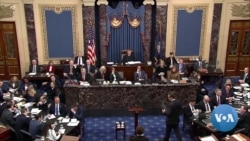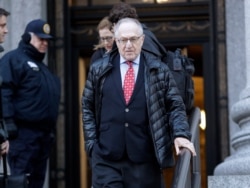The stakes over witness testimony at President Donald Trump's impeachment trial are rising now that a draft of a book from former national security adviser John Bolton appears to undercut a key defense argument.
Bolton writes in the forthcoming book that Trump told him that he wanted to withhold hundreds of millions of dollars in security aid from Ukraine until it helped him with politically charged investigations, including into Democratic rival Joe Biden. Trump's legal team has repeatedly insisted that the Republican president never tied the suspension of military assistance to the country to investigations that he wanted into Biden and his son.
The account immediately gave Democrats new fuel in their pursuit of sworn testimony from Bolton and other witnesses, a question expected to be taken up later this week by the Republican-led Senate. The trial resumes Monday afternoon with arguments from Trump's defense team.
Bolton's account was first reported by The New York Times and was confirmed to The Associated Press by a person familiar with the manuscript on the condition of anonymity to discuss the book, "The Room Where It Happened; A White House Memoir," ahead of its release March 17.
When the Times report went online Sunday night, the seven House Democratic managers immediately called on all senators to insist that Bolton be called as a witness and provide his notes and other relevant documents. Sen. Chuck Schumer, the Senate's top Democrat, issued the same call.
Trump denied the claims in a series of tweets early Monday. "I NEVER told John Bolton that the aid to Ukraine was tied to investigations into Democrats, including the Bidens," Trump said in a tweet. "In fact, he never complained about this at the time of his very public termination. If John Bolton said this, it was only to sell a book." Trump said people could look at transcripts of his call and statements by Ukraine President Vlodymyr Zelinskiy that there was no pressure for such investigations to get the aid.
He also falsely claimed Monday morning that the Democrat-controlled House "never even asked John Bolton to testify." In fact, Democrats did ask Bolton to testify, but he didn't show up for his deposition. They later declined to subpoena Bolton, as they had others, because he threatened to sue, which could lead to a prolonged court battle.
Bolton, who acrimoniously left the White House a day before Trump ultimately released the Ukraine aid on Sept. 11, has already told lawmakers that he is willing to testify, despite the president's order barring aides from cooperating in the probe.
"Americans know that a fair trial must include both the documents and witnesses blocked by the President — that starts with Mr. Bolton," the impeachment managers said in a statement.
First, though, Trump's legal team will begin laying out its case in depth, turning to several high-profile attorneys to argue against impeachment.
The lawyers revealed the broad outlines of their defense in a rare but truncated Saturday session, at which they accused House Democrats of using the impeachment case to try to undo the results of the last presidential election and drive Trump from office.
WATCH: Trump Impeachment Defense Closes First Week of Trial
The legal team is expected to pick up on that theme and also dive into areas that received negligible attention during the Democrats' presentation, including the now-concluded investigation into ties between Russia and Trump's 2016 campaign.
Trump's lawyers aren't expected to take as much time for their arguments as the Democrats, whose impeachment managers spoke for about 24 hours over three days. But they also don't need to: Acquittal is likely in a Senate where Republicans hold a 53-47 majority, with a two-thirds vote needed for conviction. Still, they see an opportunity to counter the allegations, defend the powers of the presidency and prevent Trump from being weakened politically ahead of November's election.
Trump faces two articles of impeachment. One accuses him of abusing his power by asking Ukraine to investigate Joe Biden, his Democratic rival, while his administration withheld hundreds of millions of dollars from the country. The other alleges that Trump obstructed Congress by directing aides to not cooperate with the impeachment inquiry.
The legal team will portray Trump as having been harassed by investigations from federal agents — and Democrats — since he took office and will seize on the FBI's recent acknowledgment of surveillance errors during the Russia probe. The lawyers have already hinted that they will focus attention on Biden just as he campaigns for a first-place finish in next week's Iowa caucuses.
Monday's presentation is expected to include appearances by Alan Dershowitz, who will argue that impeachable offenses require criminal-like conduct, and Ken Starr, the independent counsel in the Whitewater investigation that led to the impeachment of President Bill Clinton. Former Florida Attorney General Pam Bondi is also expected to make arguments.
Many legal scholars reject Dershowitz's arguments, saying the Founding Fathers meant for impeachable offenses to incorporate a broad range of conduct by presidents. Dershowitz told The Associated Press last week that he understood that some critics thought his argument was "bonkers" but encouraged them to listen nonetheless.
Democrats argued their side of the impeachment case for three days last week, warning that Trump will persist in abusing his power and endangering American democracy unless Congress intervenes to remove him before the 2020 election.
On Saturday, the president's attorneys said there was no evidence that Trump made the military aid contingent on the country announcing an investigation into Biden. They also accused Democrats of omitting information that was favorable to Trump's case.
Once Trump's team concludes, senators will have 16 hours to ask questions of both the House impeachment prosecutors and the president's legal team. Their questions must be in writing, and Chief Justice John Roberts, who has been presiding over the trial, will read them aloud.
Sen. John Barrasso, R-Wyo., told reporters Saturday that Republicans expected to get together on Monday to start formulating a list of questions.
"We will meet as a conference and decide what questions we want to pose, what the order may be of those of those questions," he said.
After the question-and-answer time has elapsed, the Senate will take up the question of whether to consider new witnesses and evidence — a question that could be more politically complicated with the account in Bolton's book.
Trump on Monday objected to the idea of calling Bolton, insisting it was up to House, "not up to the Senate!" to hear witnesses, even though the Senate has that right and is likely to consider the question of witnesses this week.
Four Republicans would have to break ranks to join Democrats t o call any witnesses, whic h would extend the trial for an undetermined amount of time.
Democrats have been especially seeking testimony from Bolton and acting White House chief of staff Mick Mulvaney.
An attempt to call either probably would lead to a showdown with the White House, which claims both men have "absolute immunity" from being called to testify before the Senate, even in an impeachment trial.








